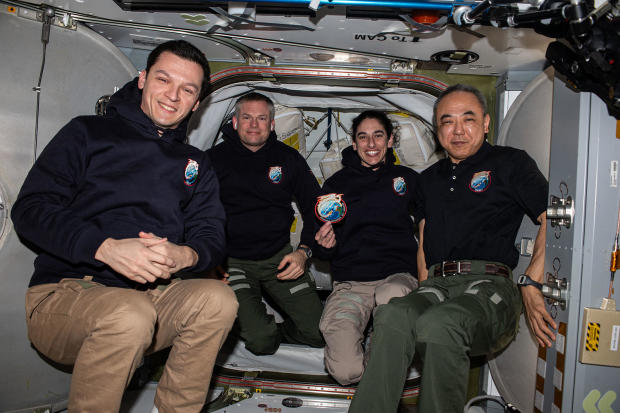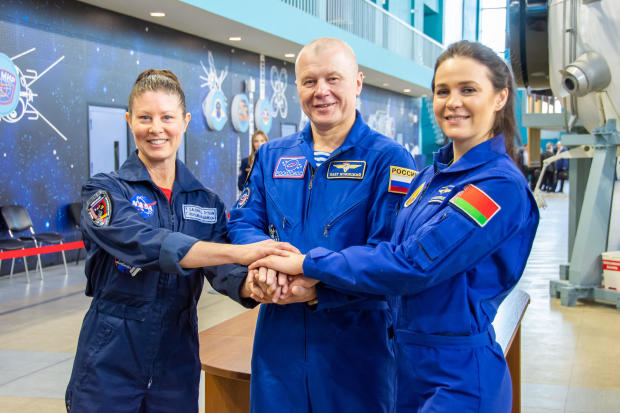
Four crew members from the International Space Station have departed and are heading towards a splashdown in the Gulf of Mexico on Tuesday.
A space shuttle called the SpaceX Crew Dragon, with four members onboard, separated from the International Space Station on Monday. This paves the way for a return to Earth and a landing early Tuesday, concluding a 199-day journey.
At 11:20 a.m. EDT, NASA’s Jasmin Moghbeli, ESA’s Andreas Mogensen, Japan’s Satoshi Furukawa, and Russia’s Konstantin Borisov detached from the upper port of the station’s forward Harmony module while traveling 265 miles above the Pacific Ocean near Hawaii.
NASA
“I am filled with sadness as I depart from this station, but I want to express my gratitude to everyone,” stated Moghbeli, a Marine pilot who flies combat helicopters. She spoke on Sunday, saying, “Despite being a small group on board, there is a large international team on the ground all around the world that makes this mission achievable.”
On August 26, Moghbeli’s team launched from the Kennedy Space Center and has since completed 3,184 orbits and traveled 84.4 million miles before returning to Earth. In addition to conducting numerous experiments, Moghbeli and fellow Soyuz crew member Loral O’Hara also participated in a spacewalk in November.
Moghbeli expressed that this achievement has been a lifelong dream, and she was anxious that it might not live up to her expectations. However, the impressive international collaboration and space station proved otherwise. It serves as a testament to what can be accomplished when we come together.
Borisov concurred that departing from the station was both happy and sad.
“We’ve been here for more than half a year, but time has passed quickly and now it’s time to return. It’s bittersweet, but I am content that we have successfully completed all the tasks we set out to do. The station is functioning well and all experiments are running smoothly. We are confident in handing over to the next team.”
Crew 7’s replacements — Crew 8
On March 3, four astronauts – Matthew Dominick, Michael Barratt, Jeanette Epps, and Alexander Grebenkin – were sent to the space station, increasing the number of crew members to 11 temporarily. The departure of Crew 7 has left the station with the current crew – Oleg Kononenko, Nikolai Chub, and NASA’s O’Hara – who are part of Crew 8.
NASA
Launched last September
Kononenko and Chub, onboard the Soyuz MS-24/70S spacecraft, are currently on a mission lasting a year. They will require a new Soyuz vessel when they return to Earth in September of next year.
The Soyuz MS-25/71S spacecraft, with cosmonaut Oleg Novitskiy, Belarus guest cosmonaut Marina Vasilevskaya, and NASA astronaut Tracy Dyson on board, will arrive at the space station on March 21. On April 2, Novitskiy, Vasilevskaya, and O’Hara will return to Earth in the same Soyuz that brought Kononenko, Chub, and O’Hara to the station last year.
In September, Kononenko, Chub, and Dyson will utilize the Soyuz spacecraft, brought by Novitskiy, to return home from their journey.
On Sunday, Mogensen, the previous leader of Expedition 70, officially transferred control of the station to Kononenko during a change-of-command ceremony. Expedition 71 will commence on April 2, when Novitskiy, Vasilevskaya, and O’Hara leave.
“We send our well wishes to you,” Moghbeli communicated to the departing Crew 7 as they left. “To those remaining on board for Expedition 71, we hope it is just as joyful and scientific as ours was. Loral, we will see you in a few weeks. And we have left peanut butter and tortillas for you in Node One.”
“Congrats on the departure,” O’Hara replied. “I miss you guys already, and thanks for that very generous gift! … Enjoy the last few hours in orbit and soft landings. Can’t wait to see you guys in a couple of weeks.”
Kononenko has broken the record for the longest cumulative time spent in space over his four missions, surpassing the previous record holder earlier this year.
During the change-of-command ceremony, Mogensen recalled his first mission in 2015 where he had the opportunity to fly with Gennady Padalka, who had then set the record for the longest time spent in space (878 days).
“You have exceeded that milestone,” he told Kononenko, “and you are well on your way to reaching one thousand days in space, which is an astounding accomplishment. When it comes to the International Space Station, there is no one more experienced than you. I am confident that I am leaving it in the best possible hands.”
On June 4, Kononenko will have been in space for 1,000 days. Once he comes back to Earth, he will have completed over three years away.
More
More
Source: cbsnews.com
